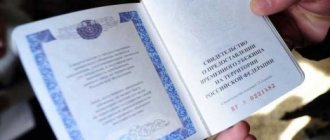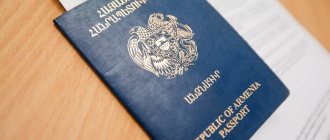After the collapse of the Soviet Union, the issue of forced migrants became acute in the Russian Federation. The Russian-speaking population of the former Soviet republics began to move en masse to Russia. To resolve all legal issues related to the reception, registration and resettlement of refugees and other migrants, Federal Law No. 4528-1 was developed and adopted.
All provisions of the law comply with the requirements of the international convention adopted by the UN in 1951 to ensure the protection of the rights of refugees and other displaced persons throughout the world. Our country joined it and signed the corresponding protocol in 1992, after which a legislative act was developed that protects the rights of all displaced people.
This legal act explains who can receive refugee status, what rights and obligations this person will have, and also explains in detail the entire procedure for obtaining refugee status.
Our legal consultation provides assistance to all foreign citizens who have difficulties obtaining official status in our country. Contact our lawyer, he will explain the federal law establishing the legal status of refugees in our country.
Circumstances that may justify recognizing a foreigner as a refugee
According to modern legislation, a person who has not committed illegal actions of a non-political nature in any country in the world can become a refugee. If a foreigner has been convicted of crimes falling under the criminal code and is afraid of being punished for it in his own country, then he will not be able to become a refugee.
The Russian Federation provides asylum to foreigners who have become victims of persecution. The reasons for such persecution are indicated in Article 2 of Federal Law No. 4528-1. If the motivation for resettlement was different, for example, military operations, man-made or natural disasters, then official refugee status cannot be assigned to this foreigner. In this case, the Russian Federation may provide temporary asylum; the procedure for granting such status is established by the relevant Federal Law.
The process of recognizing a foreigner as a refugee consists of several stages, each of which is described in detail by this regulatory act, and includes:
- direct submission of an application by a person who falls under Article No. 2 of this normative act with a request to recognize himself as a refugee and provide protection. This appeal is drawn up in writing according to the form established by the Federal Law. Anyone can submit it personally or pass it through official representatives. A petition submitted electronically is not allowed for consideration;
- after official structures accept an application from a foreign citizen, a preliminary examination is carried out, at this stage the personal data and fingerprint identification of the applicant are checked. Based on the results of this check, a decision is made on further consideration of the received application or on its refusal;
- a foreigner applying for refugee status is issued a document confirming that the case is under consideration by the migration service or a notification indicating the reasons for the refusal;
- after the initial examination, the application is transferred for further more detailed consideration;
- adoption of a final verdict recognizing the applicant as a refugee or a decision on refusal or assignment of official status;
- handing over to the person who has been recognized as a refugee a corresponding certificate or an official notification from the Federal Migration Service of the refusal.
The final decision is made after a thorough study of the questionnaire that the foreigner fills out during the second visit to the migration service, as well as the questionnaire. These are documents approved by law, samples of which are available on our website. In addition, before further processing of refugee applications, applicants for official status are interviewed. In this case, conversations are conducted with each adult member of the same family. If there are children under the age of eighteen, then their data is entered into the questionnaire of the parent or legal guardian. All information provided in these documents is subject to careful verification.
If you do not know what status you and your family members can claim according to the current Federal Law, contact our lawyer for help. He will study your circumstances and explain what type of application you need to apply to the Russian migration authorities, and what rights are possible in our country. All consultations are free.
The federal law establishing the legal status of refugees also clarifies the basic rules for filing an application for a foreigner who wishes to be officially recognized as a refugee in our country.
You can submit an appeal:
- to any representative office of Russia located in a country other than the one whose citizenship the applicant has. This type of application is subject to longer consideration; according to the Federal Law, the consulate processes the application within one month;
- When passing through the state border of Russia, you can contact the control post located at the checkpoint. Such treatment is possible both when crossing the border legally and illegally. In this case, you should contact no later than 24 hours after arriving in our country;
- upon arrival at a permanent place of residence in a certain region of the Russian Federation at the territorial branch of the FMS.
The procedure for considering applications of foreign citizens for recognition as refugees
After submitting the application for further consideration, the person wishing to acquire official refugee status is issued a certificate. This document serves as a legal basis that allows a foreign citizen to register with the local executive authorities of the region, as well as send him to places of temporary resettlement, and receive other assistance provided for by the Federal Law. In this case, the foreign citizen is obliged to transfer his national documents for safekeeping to the Federal Migration Service until a final decision is made. An experienced lawyer will explain the rights of refugees who have a certificate of acceptance of their application for further consideration. To receive a consultation, you must fill out the online form. Our lawyer's services are free.
This certificate will also allow you to count on assistance in moving and transporting luggage, receiving a one-time benefit, the amount of which is established in each specific case based on the general situation of the family, the presence of disabled members and other factors.
In addition, this certificate guarantees such rights of refugees as receiving medical assistance, food, security, the opportunity to use the services of an interpreter in order to receive all the information about the rights granted to them, as well as the further registration procedure.
Submitting an application for further consideration and obtaining the appropriate certificate also imposes certain obligations on all persons wishing to obtain official refugee status:
- comply with the current legislation of Russia;
- not violate the requirements of sanitary and hygienic standards and the rules of residence in places of temporary accommodation of displaced persons;
- obtain a medical certificate, for which it is necessary to carry out a mandatory examination by doctors and carry out the necessary tests;
- the first requirement is to provide the migration services with the necessary information about yourself and your family members, if this is necessary for further consideration of the issue and making a final decision.
Applications from foreigners will not be accepted for consideration in the following cases:
- on the territory of our country, a criminal case was initiated against a person applying to the FMS with a corresponding petition;
- if the foreigner has previously submitted a similar application, and upon repeated application no new circumstances have arisen that fall under the scope of this Federal Law;
- if a foreigner was previously denied official status in one of the countries that are parties to the Refugee Convention, and the legislation of this state does not conflict with the current Federal Law of Russia regulating the procedure for documenting and living conditions of refugees;
- if a foreigner has citizenship of several countries or the opportunity to receive full protection in another state;
- if crossing the border was illegal and the person who filed the application for official status applied later than the deadline established by current legislation;
- if you have a legal permit for permanent residence in Russia.
If a foreigner has been refused further consideration of his application, he receives an official notification of this. This document must contain information about the reasons for the refusal, as well as the procedure for appealing this decision in court. In addition, the person must be explained the legal status of his and all members of the same family being on the territory of our state.
If you have received a reasoned refusal from the Federal Migration Service to consider your application and consider it unfounded, then you can appeal this decision in court. Contact our lawyer for advice, we will help you draw up an appeal to the judicial authorities. Our website contains samples of the required applications and forms. All consultations are free and provided in a form convenient for you: by phone or online.
A foreigner who has received a refusal is required to leave our state within thirty days after receiving official notification.
The consideration of one application can last from two to three months after the certificate has been received. If necessary, this period can be extended, but not more than three months.
If a positive decision is made on a specific application, the migrant is issued a certificate, which is an official document identifying the person recognized as a refugee. All adult family members receive refugee certificates. If there are children under 18 years of age, then all information about them is indicated in the document of one of the parents or official guardian. Or that adult family member who voluntarily agreed to take full responsibility for children under eighteen years of age.
According to this Federal Law, a civil passport or other personal documents remain retained by the FMS for the entire period that the newly acquired status is valid. The certificate is valid for three years, with the possibility of extending this document. This is possible while maintaining the conditions described by the Federal Law protecting the rights of refugees. Receiving an official notification from the Federal Migration Service about the refusal to recognize a person as a refugee obliges the foreigner and his family members to leave our state within one calendar month after that. But such a person has the opportunity to appeal this decision of the FMS in the manner prescribed by law. Information about this possibility, as well as detailed explanations about the legal status of these persons on the territory of our state, must be contained in an official notice of refusal, which is handed to the foreigner.
Federal law also provides for a foreigner to receive temporary asylum in our country. People who have grounds to be recognized as refugees, but do not declare this themselves, can obtain the right to such protection from our state. Temporary asylum is also provided to foreigners who have no reason to be recognized as refugees, but there was a real threat to life in their home country. All forced migrants legally residing in Russia have similar rights.
To obtain all the necessary information about the current legislation of Russia, just fill out a special form on our website. A lawyer will contact you in a way convenient for you and answer all your questions.
Forced migrant status.
I'm interested in the Odessa region. —
To begin with, you can receive the status of a TEMPORARY DISPLAYER, for a period of up to 1 year, with which you can find a job, and then, the status of a refugee. The main form of providing protection to foreign citizens in the Russian Federation is recognition as a refugee in accordance with the legislation on refugees. The procedure for recognition as a refugee is regulated by Federal Law of February 19, 1993 No. 4528–1 “On Refugees”. In accordance with the provisions of the Law, a foreign citizen located outside the state of nationality may apply for recognition as a refugee to the Russian foreign mission, at the border or on the territory of the Russian Federation. Petitions accepted by foreign missions are reviewed and decisions are made on them by the Russian Federal Migration Service.
Petitions accepted at the border and on the territory of the country are considered and decisions are made on them by the relevant technical departments of the Federal Migration Service of Russia. Applications for refugee recognition are submitted by all adult applicants, as well as unaccompanied minors. Applicants are provided with a qualified translator. The procedure for considering an application is two-stage and consists of a preliminary consideration of the application and consideration of the application on its merits.
Preliminary consideration of the application is carried out within up to 5 days, consideration on the merits - up to three months. In some cases, the Federal Migration Service of Russia may allow the period for consideration of an application to be extended for another three months. All persons applying for asylum in the Russian Federation undergo a mandatory medical examination and fingerprint registration.
During the period of consideration of the application on the merits, the applicant is issued a certificate of consideration of the application for refugee recognition on the merits, which is a document identifying the applicant and gives him the right to stay for the period of consideration of the application and a possible appeal against the refusal to recognize a refugee. The applicant’s national documents are deposited with the Department of the Federal Migration Service of Russia. An applicant is recognized as a refugee if he has a well-founded fear of being persecuted for reasons of race, religion, nationality, nationality, membership of a particular social group or political opinion, is outside the country of his nationality and is unable or unwilling to benefit from the protection of that country protection due to such fears. A person recognized as a refugee is issued a refugee certificate. The certificate is a document identifying the owner and gives the right to stay in the Russian Federation. Information about minor children of refugees is included in the certificate of one of the parents.
To travel outside the Russian Federation, refugees are issued a travel document. To leave the Russian Federation and enter its territory, a refugee with a travel document does not need to obtain Russian visas.
Refugee status is granted without specifying a period. Every year and a half, a refugee undergoes re-registration. During the re-registration, the issue of maintaining refugee status or loss or deprivation of status is decided. Decisions on loss or deprivation of status can also be appealed. Applicants can appeal negative decisions on an application at each stage to the Federal Migration Service of Russia or to the Court. Complaints against decisions of the Federal Migration Service of Russia are considered by ordinary courts within the framework of civil proceedings. The complaint can be considered by courts of three instances, as well as by way of supervision. During the period of consideration of complaints against decisions of the Federal Migration Service of Russia, the applicant cannot be expelled outside the territory of the Russian Federation.
Rights and obligations that a foreigner receives after being recognized as a refugee
Assigning the official status of a displaced person or refugee, and receiving a certificate confirming this fact, gives the migrant who was forced to leave his country the following rights:
- the opportunity to receive assistance in preparing documents that are necessary for entry into the territory of the Russian Federation, as well as assistance in transporting luggage and moving to a designated place of residence. It is also provided for the receipt of compensation for all costs associated with travel, benefits for the payment of customs duties on imported property, and more;
- placement in a place of temporary residence, receiving food, the ability to use utilities, as well as security to ensure safety. Also, all refugees receive an allowance, which is calculated on a daily basis;
- receiving care in all public medical institutions, on an equal basis with other citizens;
- assistance in finding a job, retraining and improving existing qualifications;
- opportunity to engage in entrepreneurial activity. Refugees have the opportunity to benefit from preferential tax rates;
- social protection of refugees is provided on an equal basis with other Russian citizens;
- the opportunity to enroll your children in all state kindergartens, schools and other educational institutions on a general basis;
- use of other rights provided for by current legislation.
A person who has been recognized as a refugee in our country can freely travel outside of Russia and receive assistance in obtaining the appropriate documents necessary for travel. At his own request, a refugee can return to his country of permanent residence before the expiration of his status.
Along with the rights of citizens of the Russian Federation, a refugee receives certain responsibilities. They require compliance with the current legislation of the country. In addition, all refugees are required to register with the relevant authorities and report changes in their place of residence or personal data.
Refugee status is lost voluntarily if the migrant has a desire to return to the country of permanent residence or move to a third country to reside or obtain citizenship in the future. In addition, a refugee can receive Russian citizenship or an official residence permit, which also leads to termination of the status.
In case of violation of the law, the migrant may also be deprived of refugee status, but this is possible only after the court verdict comes into force. If false documents or false information are detected that a person submitted when submitting an application, the competent services may also deprive the migrant of official status, which allows him to enjoy all the rights of a refugee.
After official deprivation of status, this migrant is obliged to leave the territory of the Russian Federation within one month, unless the corresponding decision of the FMS has been appealed in the prescribed manner. Also, loss of status leads to deprivation of the right to use temporary housing provided by the state for displaced persons. At the same time, the rest of the family members who have retained their status retain this right.
All migrants, both those who have refugee status and those who have lost it, cannot be returned to the country of their nationality against their will, if the circumstances that allowed them to become refugees in our country are preserved.
Every person who has been refused recognition as a refugee by the migration services has the right to go to court to appeal this decision of the migration service. In order for a court decision to be in your favor, you must draft your claim correctly. Our lawyers can help with this, and the assistance will be provided free of charge.
If the claim was not satisfied and the decision of the FMS was recognized as lawful, then the migrant and his family members must leave Russia within three days from the receipt of the court decision.
Categories of persons
Main article: German refugees
The first section of the law defines the main circle of persons equated to refugees. One of the most important paragraphs of the section is § 6, which establishes the concept of “person of German nationality” regardless of his citizenship and country of origin. The text of this paragraph has changed several times throughout its existence. This section also defines the conditions under which these persons acquire the appropriate status and are entitled to resettlement in Germany and appropriate state support for social integration.
Persons of German nationality born after 31 December 1992 no longer fall under any of the categories and can only move to Germany as descendants of late migrants (German: Abkömmlinge
)[2].









